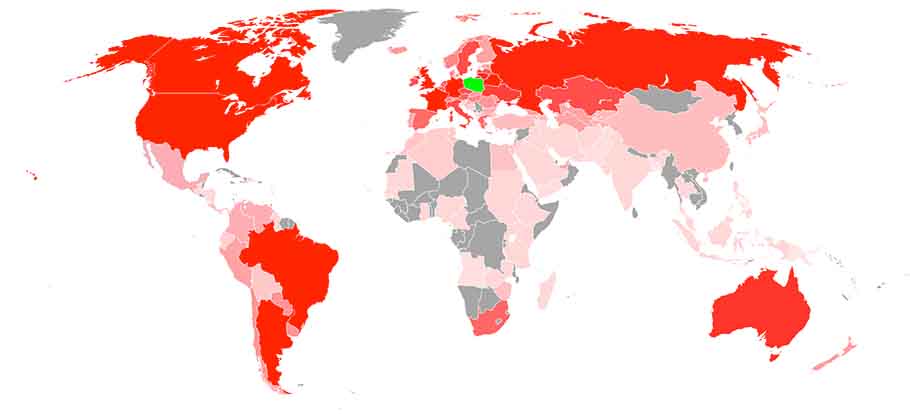CYPRIAN NORWID: God only knows how much harm and misery comes from not recognizing this part of Polish society, which is Emigration. Disapproval, doing nothing to bring it back to the country. As if the country no longer needed it for anything.
(From Kazimierz Braun's drama "The Return of Norwid")
It is no secret that the sizeable Polish diaspora abroad does not play as strong a political role in the countries of its settlement as it could play, like other minorities, such as the Jewish, Italian, or German. It would be of benefit to it, first of all, because it would allow it to pursue its interests more effectively – but it could also turn out to be beneficial for Poland, because – as I had ample opportunity to find out – the Polish community is very patriotic. Therefore, it is worth considering why this is so, that is – why the Polish communities have little or no influence on the politics of the countries where they settle.

The Polish Diaspora in the world 2008 (Source: Wikipedia)
I shall divide the reasons for this into external and internal. I could see the external ones during my first visit to the United States in 2007. Here I found out that the attitude of Polish diplomatic missions, as well as agents of influence who were located in various countries of the widely understood West in the last years of the Polish People's Republic, was aimed at torpedoing any attempts at political integration of the Polish community. To this accusation, officials of the diplomatic services reply that it is the result of some organic inability of the Polish diaspora to organize politically.
Interestingly, a similar argument was put forward in the eighteenth century by the so-called French philosophers, or publicists, hired for this purpose by countries that stripped Poland of its statehood in the second half of that century – as if Poles suffered from an organic inability to lead their country. Such a view, however, does not stand up to criticism, because 200 years earlier, the same Poles were not only superbly able to lead their country, but also maintained a superpower position that Poland lost only at the end of the 17th century. Why, in the 18th century, Poland lost its independence and finally ceased to exist as a state? There are certainly many reasons, but I would like to mention one, that is – the agency.
After the Swedish "deluge", which caused the devastation of the country comparable to the devastation during the Second World War, a social class appeared in Poland that had not existed before, i.e. the non-landed nobility. They were destitute people, but with political rights that they learned to commercialize very quickly. As a result, the magnates took money from foreign courts, and the non-landed nobility – from the magnates whose clientele it comprised, and – thanks to democratic procedures in which all nobility participated – foreign courts gained more and more influence over the Polish state.
As early as 1720, Prussia and Russia concluded a secret treaty in Potsdam to block any attempt to enlarge the army in Poland and to maintain the existing political system. They could oblige each other to do so, because each signatory to this treaty had an agency in Poland that was so extensive that they could easily carry out such a blockade. That is why the Four-Year Seym, the same one which passed the constitution of May 3, deprived the non-landed nobility of political rights by a special act, that is, the right to vote in the assemblies, where deputies were elected. Thus, the reason was not some "organic" inability of Poles to lead the state, but the destruction of its structures by agents.
Under the communist rule, the same agency was a tool for manipulating the Polish community abroad and breaking its unity. It was even more understandable then, because the Polish community was perceived by the communists as a hostile environment, so both diplomatic missions, and agencies of influence were focused on breaking up its activities. However, in the 18 years after the political transformation, this type of attitude is more difficult to understand.
The explanation of the reasons for this state of affairs is evident in a petition delivered to the US Congress by the then President of the Polish American Congress, Edward Moskal. It was about admitting Poland to NATO, which was demanded by 9 million signatories. The fact that President Moskal managed to collect 9 million signatures on this petition proves that, at least in some cases, the political integration of the Polish diaspora is possible. But soon after that, the campaign of discrediting the president of Moskal in the US as an "anti-Semite," and so on, began, led by prof. Bronisław Geremek of the Ministry of Foreign Affairs in Warsaw, which in turn led to his ceasing to be accepted in the White House. It is not difficult to guess that prof. Geremek, knowing about the Jewish claims against Poland, which had already been disclosed in 1996, had to come to the conclusion that no Polish political lobby in the US is needed since there is already a strong Jewish lobby there. And it stayed that way.
Looking for internal reasons, I would like to point out the exuberant individualism that is an element of the Polish mentality that is not conducive to political integration, which requires a minimum of discipline. This is used by the Polish authorities, which, for their own convenience, prefer to multiply fictitious entities in the form of Universal Polish Diaspora Unions, appoint its president, who in fact does not represent anyone, but who is on the Ministry of Foreign Affairs' pot, and to deal with him, that is, assign him tasks that he performs. As a result, initiatives are running out of steam, that is, sometimes quite a lot of money is thrown down the drain without any benefit for the Polish diaspora or for Poland. Is there any way out of this situation? Fortunately, I believe, there is.
Restore the Full Political Rights
The first step towards overcoming this unfavorable situation should be the exercise by the Polish community, that is, by Polish citizens permanently living abroad, of full constitutional political rights, in which they have been limited. The point is that the constitution does not make the scope of citizens' political rights dependent on their place of residence. Meanwhile, Polish citizens permanently residing abroad, cannot put forward their own candidates in parliamentary elections, but have to vote for candidates put forward by someone else in the Warsaw-Śródmieście constituency. For this purpose, it would be necessary to contact parliamentarians right now, who would lead to enacting a slight correction of the existing electoral law, so that the citizens living abroad would be entitled to propose their own candidates to Seym.
Four Constituencies
One problem immediately arises: okay, but in which constituency would these candidates be registered? Well, the proposal is to establish the constituency for candidates put forward by citizens permanently living abroad as the entire continent. One constituency would be North America. The second - South and Central America. The third is Europe, and the fourth is Australia. There would be 4 seats per district - 16 in total. Why so many? Because a parliamentary club whose chairman participates in the Convention of Seniors and influences the course of legislative work of the Sejm must consist of minimum 15 deputies. Contrary to appearances, this carries a certain meaning, and besides, it adds prestige to such a politician. On the other hand, 16 MPs are not able to bring about any revolution in Poland – which is very good. For if there were, let's say, 160, they could push through laws that would entail financial consequences for citizens permanently residing in Poland, which would likely lead to unnecessary conflict situations. On the other hand, these 16 deputies could effectively force the Ministry of Foreign Affairs not to treat the Polish diaspora instrumentally, among other things due to the fact that such deputies would not be petitioners asking for favors whose letters can be thrown into the garbage bin, but parliamentarians submitting interpellations to which the government must respond.
Organizational Minimum
However, these Polish deputies would have to be elected first. First of all — candidates must be selected. For this purpose, some groups should organize themselves not only to put forward their candidate, but to convince those who will vote in the elections, and to raise funds that would allow the candidate to conduct an election campaign – which requires not only media activation – including social media – but also direct meetings in all larger Polish communities within the constituency. In short, it requires a certain organizational minimum that would allow a candidate to become an MP.
And once (s)he becomes an MP, (s)he would probably like to become one again – which would have some advantages, for example, in the form of parliamentary and political experience and, simultaneously, would satisfy human ambition, with which there is nothing wrong, because a politician should be ambitious. Therefore, such an MP would, in his/her own interest, ensure that the organization that contributed to his/her election did not fall apart the day after the vote, but would survive as long as possible. In this way, the foundations for a stable Polish lobby in the countries of settlement would be laid and, after 20-30 years, such a lobby could gain significant influence for the benefit of itself and Poland. Because it must be viewed as a long march and one has to be prepared for it.
Youth Is Needed
This long march requires maintaining a generational continuity, and this cannot be achieved without the influx of more and more young people who would not only know about Poland, know its history and present, but also feel an emotional bond with Poland. To this end, Polish parliamentarians should make sure that most of the funds that Poland allocates to the Polish diaspora are used for broadly understood educational purposes. It is about supporting Polish schools abroad, where children and young people would not only learn the language, literature and history of Poland, but also — in which the educational program would be aimed at highlighting the greatness of Poland, its power, its victories, so as not to focus on the martyrdom side of Polish history. Contrary to appearances, this is important — which was pointed out by a certain Russian fellow, who told me in an interview, that he would not like to be Polish. When I asked him "why?" — he replied: "because you have no heroes." This is the result of presenting Poland to the outside world in terms of martyrdom.
An important element of this work with young people should be the shaping of an emotional relationship with Poland. For this purpose, the state should organize summer stays in Poland for the Polish youth, at the state's expense, during which Poland should be shown to young people in such a way, as to arouse their sentiment towards the country. It is also important that young people from all continents should participate in such summer camps at the same time. Acquaintances, friendships, and sympathies established during their stays in Poland would not only bring Poles together all over the world, but would also consolidate their memories and sentimental ties with Poland. This is what it is all about.
Translated from Polish by Andrew Woźniewicz.







